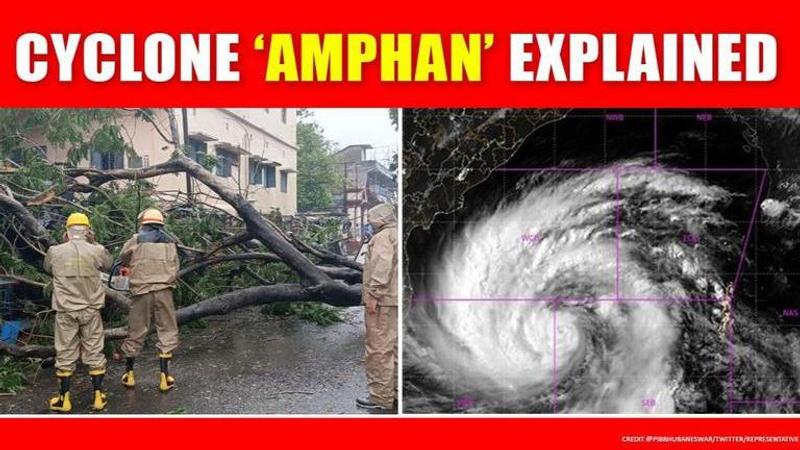Published 12:24 IST, May 20th 2020
Cyclone Amphan's name & meaning explained: All about the 'extremely severe' cyclonic storm
As Cyclone Amphan approaches close to the Bay of Bengal putting millions of lives at risk, here's a look at what 'Amphan' means and origins of naming cyclones.

As Cyclone Amphan approaches dangerously close to the Bay of Bengal, authorities have started evacuating residents from vulnerable locations and moving them to relief shelters. Odisha Chief Secretary Asit Kumar Tripathy on Monday revealed that the State evacuated around 60,000 people as a precautionary measure. WB CM Mamata Banerjee also announced as many as 3 lakh people have been rescued so far from the State.
According to the Indian Meteorological Department (IMD), Amphan is now the strongest cyclone ever recorded in the Bay of Bengal, surpassing the 1999 Odisha super cyclone at 260kmph. With NDRF and other frontline workers waiting on the heel to step in and help as Amphan is expected to make a landfall Bengal today, May 20, authorities expect it to weaken into an 'extremely severe' category cyclonic storm.
It might be important at this stage to note that naming a cyclone makes communications easier as it reduces confusion when multiple tropical storms are occurring at the same time.
How was Cyclone Amphan named?
The word 'Amphan', pronounced "Um-pun", originates from Thai and means "sky". The name was suggested by Thailand back in 2004. The names are chosen from a list by a host of member countries part of the World Meteorological Organisation (WMO), a specialised agency within the UN's Economic and Social Commission for Asia and the Pacific. (ESCAP).
Originally formed in 1972, the ESCAP panel included Bangladesh, India, Maldives, Myanmar, Oman, Pakistan, Sri Lanka and Thailand. However, in 2018, the panel expanded to include five more countries from West Asia - Iran, Qatar, Saudi Arabia, UAE and Yemen. With the inclusion of the new States, the list now has 169 names, enabling all 13 member countries to suggest 13 names each.
As it stands, all cyclones that form in ocean basins in this part of the world are named by these countries in theWest Asian and APAC regions. The authority to name the cyclones forming in the region is mandated to them by the organisation which explains the reason for it is to reduce confusion and make it easier for people to remember and refer to the names.
Thailand's suggestion was reportedly the last one on the current list. Once all 169 names are over, a new list is constituted by member-states and the same method is followed. According to the Press Information Bureau update, the next few cyclones will be named as follows:
Nisarga - Bangladesh
Gati - India
Nivar - Iran
Burevi - Maldives
Tauktae - Myanmar
Yaas - Oman
Updated 12:24 IST, May 20th 2020




